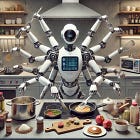I have previously covered Computational Gastronomy in my very first Substack post, the first issue of my Research Digest newsletter. Today, I’m talking to prof. Ganesh Bagler, the pioneer of this emerging field that blends data science, cuisine and human health.
Gastronomy → Data Science ?
“Computational gastronomy is an odd pair of terms being brought together” says prof. Bagler. “On one side, you have subjective sensation related to food, flavors. And on the other side, you have computation, which is dry, quantifiable, and very, very objective. [..] when I look at it, having worked in this area where food and computation are brought together, has been a magical process”.
Computational gastronomy are indeed two words that one doesn’t expect to find next to each other, and yet here we are. Ganesh and his colleagues have spent over a decade establishing the foundations of this new discipline that leverages data science and artificial intelligence to transform cuisine and nutrition.
Computational gastronomy seeks to answer questions about why cuisines are the way they are, and to address modern problems in food and nutrition “Are there patterns in the way the ingredients are combined in them? […] Can I create a recipe which is nutritious and healthy? Can I create a recipe which is cost effective, one which is carbon-footprint minimized?” To answer these questions, professor Ganesh Bagler and his colleagues have developed tools and approaches to study food from a holistic and multidisciplinary prospective, which collectively belong to the field of computational gastronomy.
“The data structure of a recipe”
Food is complex. The flavor profiles of ingredients, their quantities, the way they are processed and cooked, as well as the cultural signifiers that is attached to food are just some of the many factors that make a recipe what it is. “I call it as the data structure for a recipe. I have a vision that like one has a data structure for storing images — for grayscale images as well as color images— there is a way by which a recipe can be stored to capture all its nuances”. Different from simpler data structures, food data as envisioned by Ganesh is highly dimensional, trying to capture the many different aspects that make a recipe.
Because of the inherent complexity that comes with food and cooking, compiling a well structured database that serves the needs of computational gastronomy was no trivial task. When Ganesh first started out in this new field, he had to start from the ground up. “We need to have a structured database of flavor compounds which [includes] their ingredients, their sources, natural resources from where they're coming, et cetera.” This is where most of the initial efforts of prof. Bagler were directed to in order to establish solid foundations for computational gastronomy.
“Over the last 10 years we have been doing this, compiling structured databases ” and it shows . Bagler and his team have put together FlavourDB, a highly curated database that brings together the flavor molecules of thousands of ingredients, equipped with an interactive user interface. Among other accomplishments of Bagler’s teams in this area we find RecipeDB, SpiceRX and DietRX.
Food pairings and the genealogy of cuisine
The toolbox of computational gastronomy allows to explore cuisine and food in a truly novel way. One of the aims of prof. Bagler and his colleagues is to analyze the genealogy of cuisines from all over the world and how they relate to each other.
In computational gastronomy cuisines are characterized by food pairings, which are at the basis of their culinary fingerprints. For example, tomatoes and mozzarella are often found together in Italian dishes, as well as olive oil and garlic, cheese and ham etc… All these pairings together somehow capture the essence of the Italian cuisine. Ganesh and his team have surveyed regional cuisines in India thanks to the wealth of data compiled by Bagler and his team over the years, developing an approach that allows computational gastronomers to explore patterns in different cuisines analogously to what linguists do with languages.
A Turing Test for chefs
Computational gastronomy aims to leverage data and computational techniques to enable to create entirely new recipes that satisfy certain requirements. A recipe-generating artificial intelligence could help us design new recipes tailored to specific flavor profiles, carbon footprints, or health requirements.
Ganesh and his team provided a proof-of-concept of such tool and tested it using a novel approach developed by their team. “the assumption here is that an expert chef […] should be able to read a recipe and make a judgment himself or herself about how coherent the recipe […] reads like”. When Ratatouille, Bagler’s AI cook, was tested in such way, roughly 7 out of 10 chefs were “tricked“ into believing that AI-generated recipes were human-made.
Computational gastronomy is not limited to academic curiosity. Bagler and his colleagues are also the proud founders of Foodoscope, “a platform that enables leveraging Computational Gastronomy API resources. The APIs include data points for traditional recipes, nutrition profiles, flavor molecules of natural ingredients, health associations, and carbon footprints.” (Foodoscope website) demonstrating the potential applications of computational gastronomy in the food industry.
Listen to the episode
The interaction of food and the human body is incredibly complex. In Bagler’s view our current understanding of how foods affect human health is limited, and could enormously benefit from the adoption of a system-level approach. In this episode of EggCeptional Research, we also discussed the limitations of the ways in which nutrition is currently approached.
I bet you have some questions now. I did too when I first came across the work of Ganesh, and he was so kind to listen to and answer my doubts. Listen to the full episode for an in-depth exploration of this fascinating and truly multidisciplinary discipline. I truly enjoyed this conversation, thanks to Ganesh Bagler’s insightful attitude and enthusiasm — hope you will too.
You can follow Ganesh on X and take a closer look at his work on the webpage of the Complex Systems lab.








Share this post